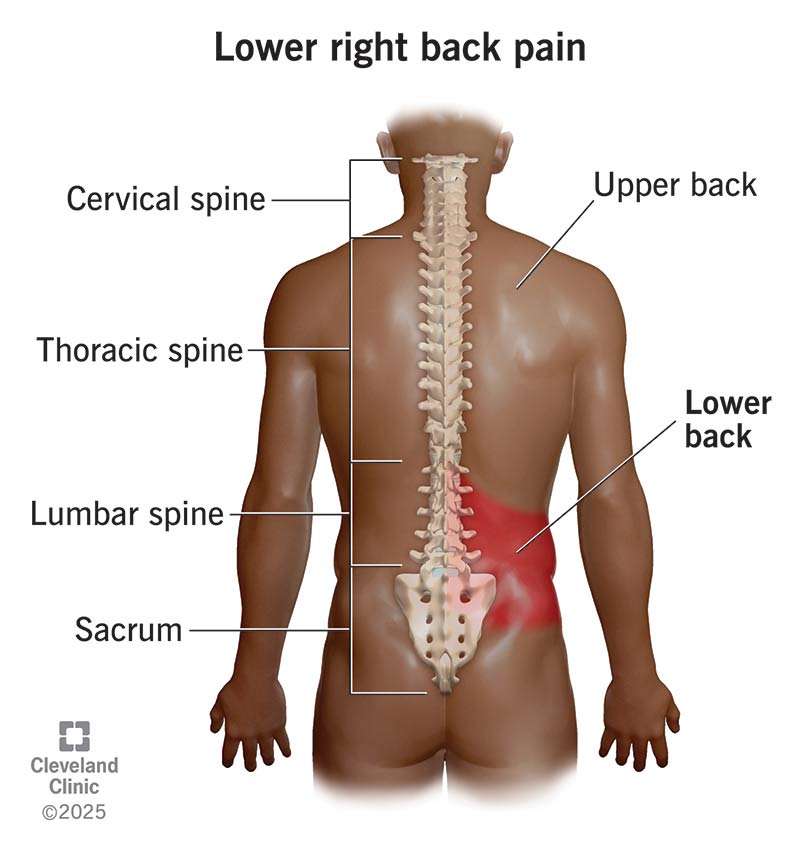Lower right back pain is a common issue for people around the world. Usually, it’s because of an issue with your back itself. But sometimes, lower right back pain can happen because of much more serious conditions. If your pain hangs around for more than a few days or gets worse, even with rest, it’s time to talk to a healthcare provider.
Advertisement
Cleveland Clinic is a non-profit academic medical center. Advertising on our site helps support our mission. We do not endorse non-Cleveland Clinic products or services. Policy

Image content: This image is available to view online.
View image online (https://my.clevelandclinic.org/-/scassets/images/org/health/articles/22864-lower-right-back-pain.jpg)
Lower right back pain can happen anywhere on the right side of your back between your hips and the bottom of your rib cage. Having low back pain just on one side can happen for many reasons. While many of them aren’t serious, sometimes it’s a sign of an issue that needs medical care.
Advertisement
Cleveland Clinic is a non-profit academic medical center. Advertising on our site helps support our mission. We do not endorse non-Cleveland Clinic products or services. Policy
Lower right back pain can feel different depending on the cause. It might feel like:
Lower right back pain can happen for many reasons, including:
Mechanical causes have to do with your back itself. That includes your spine, back muscles and soft tissues. Back pain from these causes can happen because of injuries, age-related wear-and-tear or diseases. And a few of them happen for unavoidable, normal reasons.
Some examples of mechanical causes include:
Lower right back pain can also come from conditions affecting your spinal cord or the spinal nerves that branch off it. Some examples of nervous system causes include:
Advertisement
Some conditions that affect your whole body can cause back pain. These are often chronic conditions, meaning they’re long-lasting or lifelong. They include:
Referred pain is when you feel pain in a different place from the source of the pain. You can have referred pain in your lower back from conditions that affect internal organs. It happens because where you feel the pain shares nerve connections with the source of the pain.
Some examples include:
The treatments for lower right back pain vary widely. They depend on many factors, especially:
First-line treatments for lower right back pain can include:
When your pain or its cause is more severe, your provider may recommend further treatments, like:
Your healthcare provider is the best person to talk to about treatments. They can explain your options and offer guidance.
Referred pain treatments are very different from treatments for other back pain causes. Some examples include:
Advertisement
Because there are so many variables, your healthcare provider is the best person to ask for more info. They can tailor the explanation to your specific situation.
The possible complications of not treating lower right back pain depend mainly on the cause. If your pain is from a pulled muscle or whiplash, your risk of complications is low. All you need to do is wait for it to heal.
But when lower right back pain is long-lasting or comes from serious conditions, not treating it can have major consequences. Nerve-related causes can lead to nerve damage, weakness and even paralysis. Untreated infections can spread and cause life-threatening events like sepsis.
And pain itself can be harmful in the long run. That’s because having chronic pain can change how your nervous system handles pain. That can lead to conditions like:
Being in pain can also disrupt your life in all kinds of ways. It can affect your job, your hobbies, how you spend time with loved ones and more. That’s why back pain is one of the leading disability causes worldwide.
Advertisement
Some causes of lower right back pain are preventable. But many happen unpredictably or for reasons you can’t help. Some things you can do to reduce your risk of lower right back pain include:
Your healthcare provider may have guidance or resources to help you avoid lower right back pain, too.
You should see a provider when you have back pain that:
Advertisement
Back pain is an emergency and needs immediate care if:
Yes, lower back pain — on either side — is very common during pregnancy.
Maybe you pulled something while working around the house. Or you might wonder if it’s a kidney stone. Whatever the cause, lower right back pain can put a damper on your life.
Usually, lower right back pain will get better on its own. But if you have reason to think it’s something serious, talk to your healthcare provider. They can help you find answers and look for ways to reduce or stop your pain.

Sign up for our Health Essentials emails for expert guidance on nutrition, fitness, sleep, skin care and more.
Learn more about the Health Library and our editorial process.
Cleveland Clinic’s health articles are based on evidence-backed information and review by medical professionals to ensure accuracy, reliability and up-to-date clinical standards.
Cleveland Clinic’s health articles are based on evidence-backed information and review by medical professionals to ensure accuracy, reliability and up-to-date clinical standards.
Low back pain can be a constant interruption in your daily life. Cleveland Clinic’s experts can help craft a treatment plan to help you find relief.
